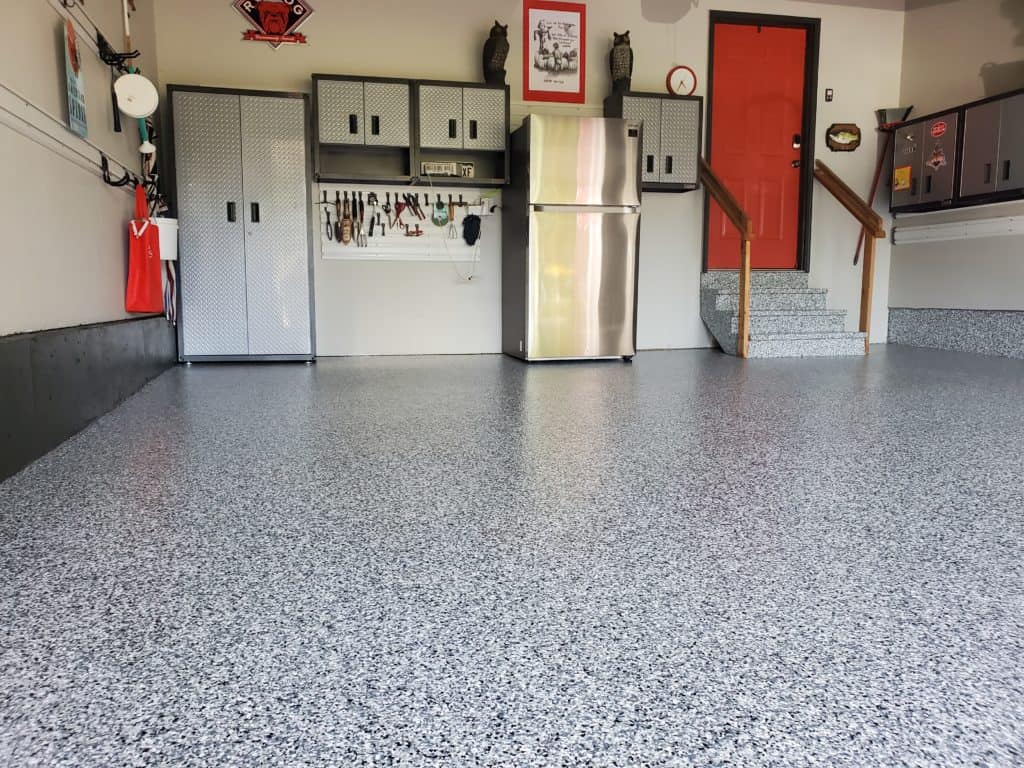Garage Floor Omaha NE can lead to a host of issues, including mold growth, rusting of tools and equipment, and damage to stored items.

Fortunately, there are several effective methods for preventing moisture buildup and keeping your garage floor dry and safe. In this comprehensive guide, we’ll explore practical strategies, preventive measures, and maintenance tips to help you combat moisture in your garage effectively.
Understanding the Causes of Moisture Buildup
Before diving into prevention methods, it’s essential to understand the common sources of moisture in your garage:
- Weather Conditions: Rain, snow, and humidity can contribute to moisture buildup in your garage, especially if it lacks proper insulation and ventilation.
- Groundwater Seepage: If your garage is built below ground level or in an area with a high water table, groundwater may seep through the concrete slab or foundation walls, leading to moisture infiltration.
- Condensation: Temperature differentials between the inside and outside of your garage can cause condensation to form on surfaces, including the floor, walls, and ceiling.
- Leaky Plumbing or Appliances: Plumbing leaks, malfunctioning appliances, or dripping air conditioning units can introduce moisture into your garage environment.
Preventive Measures to Combat Moisture Buildup
Now, let’s explore practical strategies to prevent moisture buildup on your garage floor:
- Improve Ventilation: Proper ventilation is essential for reducing humidity levels and promoting air circulation in your garage. Install vents or exhaust fans to facilitate the exchange of indoor and outdoor air. Consider adding ridge vents or soffit vents to the roofline to allow hot air to escape and fresh air to enter.
- Seal Garage Door Gaps: Inspect your garage door for gaps, cracks, or gaps around the perimeter and bottom seal. Use weatherstripping or garage door threshold seals to seal any openings and prevent water infiltration during rain or snowstorms.
- Install a Dehumidifier: A dehumidifier can help control indoor humidity levels by removing excess moisture from the air. Choose a dehumidifier with adequate capacity for your garage size and consider placing it in a central location for optimal effectiveness.
- Use Waterproofing Sealants: Apply a waterproofing sealant or epoxy coating to your garage floor to create a moisture-resistant barrier. These sealants can help prevent water penetration and protect the concrete surface from damage.
- Address Drainage Issues: Ensure that your garage floor slopes away from the entrance to encourage proper drainage during rain or snowmelt. Consider installing a French drain or trench drain system to redirect water away from the garage and prevent pooling.
- Inspect and Repair Plumbing: Regularly inspect your garage for signs of plumbing leaks, such as damp spots, water stains, or puddles. Repair any leaky pipes, faucets, or appliances promptly to prevent moisture buildup and water damage.
- Use Moisture Absorbent Materials: Place moisture-absorbent materials such as silica gel packets, desiccant bags, or moisture-absorbing mats in areas prone to moisture buildup, such as near entryways or beneath water heaters.
- Store Items Properly: Elevate stored items off the floor using shelving units or pallets to prevent them from coming into contact with moisture. Consider using moisture-resistant storage containers or plastic bins to protect belongings from water damage.
- Maintain Gutters and Downspouts: Keep gutters and downspouts clear of debris to ensure proper water drainage away from your garage. Clean gutters regularly to prevent clogs and blockages that can lead to water overflow and seepage.
- Monitor Indoor Humidity Levels: Use a hygrometer to monitor indoor humidity levels in your garage regularly. Aim for relative humidity levels between 30% and 50% to prevent moisture-related issues such as mold growth and corrosion.
Conclusion:
Preventing moisture buildup on your garage floor is essential for maintaining a dry, safe, and functional space. By implementing practical strategies such as improving ventilation, sealing garage door gaps, using waterproofing sealants, addressing drainage issues, and storing items properly, you can effectively combat moisture and protect your garage from water damage. Regular maintenance, monitoring, and proactive measures are key to ensuring long-term success in preventing moisture buildup and preserving the integrity of your garage space.
The Garage Floor Company Omaha
15125 Industrial Rd, Omaha, NE 68144, United States
1-402-576-5599
